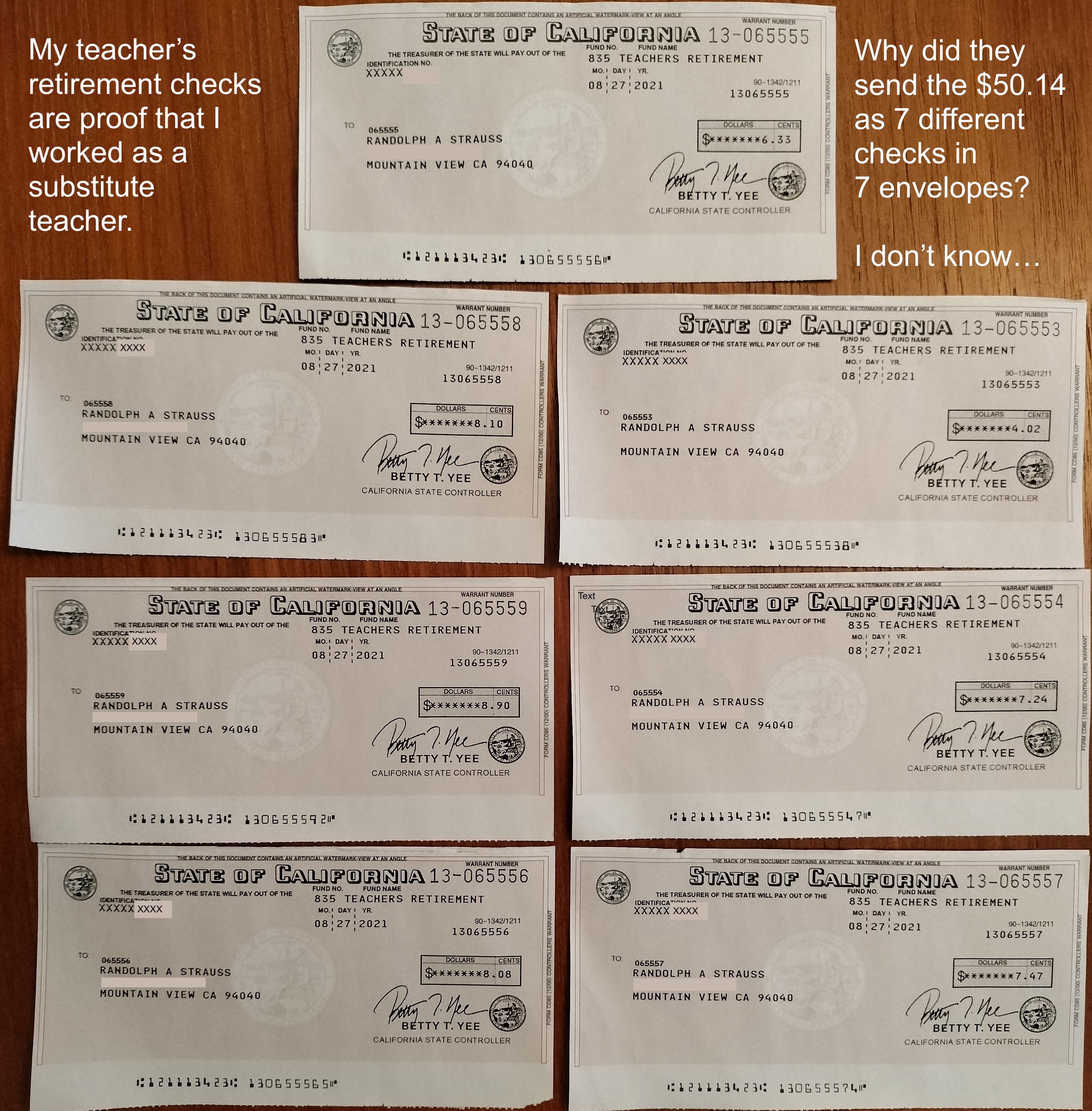| Home Blogs | Copyright 2023, Randy Strauss |

I think it was in 2002 and 2003 that I took classes toward becoming a math teacher. I did well in the courses, but eventually decided teaching wasn't for me.
It began in 2002 during the tech downturn after 9/11. I had been unemployed for a while and saw something about a "tech-to-teach" program. I have 2 bookshelves full of books about teaching, half of which are first-person stories about people's experiences. I wanted to communicate the wonders of math to others.
So I applied to the program at San Jose State. It included getting fingerprinted, passing the test about the constitution, observing classes, and would have involved actual teaching, had I stuck with it.
Since I was unemployed, I also signed up to be a substitute teacher at a number of nearby school districts. I probably worked less than 30 days, besides doing my assigned classroom observation and teacher interviews.
The math and problem-solving classes were great, and I did well (except for one class that I completely forgot about, so never went, and failed.)
But the teaching was frustrating. It was so slow. When I was a student, I watched the teacher like she was television, soaked stuff up, and quickly did the homework. Occasionally if I didn't understand something, it would gel over the next few weeks. It mostly worked for me.
(The one exception was in 11th grade when I didn't understand the quadratic formula, taught just before the end of the semester, so missed those problems on the test and got my only B in math. That was a shock, so over the next few weeks my brain figured it out...)
But the kids in my classes didn't understand. It puzzled me, so I did some research. What were kids thinking that they got math wrong? Searching the world's libraries as best I could, I found one small book by a British grad student. When kids got stuff wrong in geometry, he interviewed them and drew pictures about what they were thinking.
No wonder so many kids can't do math if no one knows what they're doing instead of understanding!
I took many (non-math) courses after college in which we created "breakthroughs" in our lives. Most of the work involved first discovering our own strange thoughts, often formed when we were young children. Discovering them as adults and teasing apart "what happened" from "the story" we told ourselves, we could see that our thoughts were naive, mistaken, and limiting.
It turns out it's difficult to continue thinking in terms of thoughts one considers naive and mistaken. This process allowed us to get past these limiting thoughts, create new possibilities, and see and pursue new opportunities.
But standard education wasn't interested in this process. Instead of addressing their misunderstanding, the state-of-the-art was to show them problems that exemplified the real models, relationships, and formulae. Trying to put one model atop whatever model is in their brains works poorly, but that's the job.
I talked it over with a teacher for whom I had substituted a few times. I confessed I seemed not to be suited for teaching. She said, "Really, it's not that hard. Once you're organized, that's over half the battle."
But organization isn't my strong suit (except while I'm working on a problem.) Organizing a curriculum and creating lessons could be interesting, but the bulk of my job would be slowly work through them with the kids. I'd be curious and bored. It seemed to be a lot of organization and slow, frustrating work that I was not passionate about.
Plus, studies show that good math teachers tend to be people for whom math didn't come easily. Full-time teaching didn't seem to be for me.
PS: In 2021, when I was 64, I got tired of receiving quarterly emails about my teacher's retirement account. So I cashed it in, all $50.14! Strangely, over 2 days I received 7 checks in 7 envelopes. Why did they spend about $5 on stamps and envelopes?
I don't know. Maybe it was a sign from the universe that my true calling was to fix government and politics.